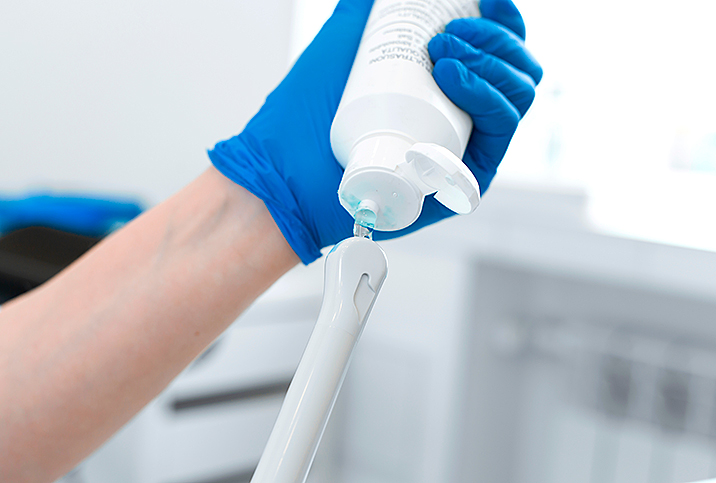Large Study Raises Questions About Ovarian Cancer Screening

Being screened for cancer is part of routine medical care. There's a feeling of safety when you head to your yearly physical knowing if something's concerning, your provider will find it.
"Women are very accustomed to the idea that you can screen for cancers," explained Felice Gersh, M.D., OB-GYN, founder of the California-based Integrative Medical Group of Irvine.
The reality is, while some lives are saved by certain screenings, such as mammograms for breast cancer and Pap smears for cervical cancer, it's not anywhere near what you think. "There's the idea that if you simply find cancer at an early stage or a lower size, you're going to have a big impact," Gersh said.
Sometimes the best we have isn't good enough. In a recent study of over 200,000 post-menopausal women, published in the peer-reviewed medical journal The Lancet, researchers found routine screening for ovarian cancer didn't actually prevent any deaths.
'There's the idea that if you simply find cancer at an early stage or a lower size, you're going to have a big impact.'
At first, the UK Collaborative Trial of Ovarian Cancer Screening (UKCTOCS) findings seemed positive, as screening does appear to detect cancer early, according to the study's authors. But after 16 years, researchers didn't find that early diagnosis prevented deaths from ovarian cancer, which is the most fatal of reproductive cancers and one that typically affects women ages 55 to 64. About 13,770 women will die this year from ovarian cancer, according to the American Cancer Society.
The UKCTOCS study authors were disappointed in the results because screening didn't seem to decrease deaths from ovarian cancer, and therefore, routine screening for all women can't be advised.
Kecia Gaither, M.D., MPH, FACOG, who is double board-certified in OB-GYN and Maternal-Fetal Medicine, was disappointed as well. "I'd hoped that universal screening would afford a modality to improve outcomes and decrease the death rate," she said, "and it didn't."
Gersh, on the other hand, isn't surprised by the results. Finding a small tumor doesn't mean the outcome will be different, she explained. It's when cancer metastasizes or spreads to other areas of the body that causes so many deaths. "You could have a very tiny cancer that's already metastasized, and you can have a very large cancer that has not."
How ovarian cancer is currently screened
According to the Ovarian Cancer Research Alliance and the Centers for Disease Control and Prevention, there is "no simple and reliable way to screen for ovarian cancer in women who do not have any signs or symptoms."
However, pelvic exams, ultrasounds of the ovaries and a blood test called CA-125 are all ways doctors use to detect and diagnose ovarian cancer. Based on the UKCTOCS study results, Gaither emphasized that "screening may be able to detect disease earlier, but ultimately have no impact on reduction in death from ovarian cancer."
For both Gaither and Gersh, their recommendations for screenings haven't changed as a result of this study.
Gaither's practice consists mainly of pre-menopausal women, and they sometimes request ovarian cancer screening. Gaither honors those requests.
Gersh, too, said she won't refuse if one of her patients with no known risk factors wants to be screened. But she warned the issue with this is the chance of something harmless being found on ultrasound creating needless stress. "If a postmenopausal woman has a two centimeter [growth] on an ovary, they'll become anxious, and they'll want to go down the rabbit hole," she said. "If it happens to grow from two centimeters to 2.5 centimeters, suddenly you're getting [blood tests], more ultrasounds, and creating so much anxiety."
When is ovarian cancer screening appropriate?
There are situations where screening for ovarian cancer is appropriate, such as:
- Mutations in the BRCA genes
- First or second-degree relative with ovarian cancer
- Being pregnant after age 35
- Hormone replacement therapy after menopause
For these risk factors, Gaither recommends an ultrasound screening and further tests, including the CA-125 blood test and genetic testing. Based on the results, it might be advised to see a specialist. Surgically removing the ovaries as a preventative measure, known as prophylactic oophorectomy, can help reduce the risk of cancer.
Screening for ovarian cancer is still important
Gersh is unsure if screening makes a difference for low-risk women. "I don't know that there is clear data on that," she said. False positives, meaning when testing incorrectly indicates a condition is present, can cause more harm than good.
"We don't want to miss something in a higher risk person," Gersh said. "And for them, we're more willing to accept a false positive. But whether we're really changing mortality, we don't really know at this point."
In women who are at higher risk, it's important for cancer to at least be found, even if it doesn't save a life in the end. "Maybe we can improve quality of life. Knowledge is still power," Gaither said. "It's still important for people to know what's going on in their bodies."




















